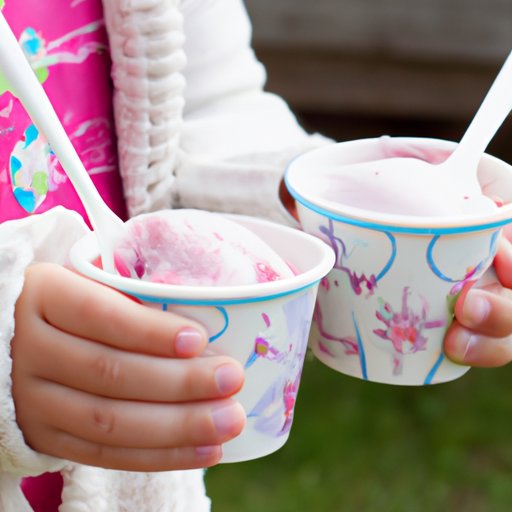
Making Homemade Ice Cream: A Delicious and Fun Summer Activity
There’s nothing quite like a scoop of cold, creamy ice cream on a hot summer day. While store-bought ice cream is delicious, there’s something special about making your own. Not only is homemade ice cream a fun family activity, but it also allows you to create unique flavors, experiment with ingredients, and have control over the quality of ingredients used. In this article, we’ll provide a step-by-step guide to making perfect homemade ice cream, discuss the science behind the process, explore healthy alternatives, and provide ideas for making ice cream a fun summer activity for the whole family.
Step-by-Step Guide to Making Delicious Homemade Ice Cream
The first step in making homemade ice cream is selecting the right ingredients. In general, you’ll need heavy cream or half-and-half, sugar, egg yolks, and vanilla extract. From here, you can add other ingredients to make different flavors or variations of ice cream. For example, add cocoa powder for chocolate ice cream or strawberries for strawberry ice cream.
To make the ice cream base, heat the cream and sugar in a saucepan until the sugar dissolves and the mixture is hot but not boiling. Meanwhile, whisk the egg yolks in a bowl. Pour the hot cream mixture slowly into the egg yolks, whisking constantly, until fully combined. Pour the mixture back into the saucepan and heat over medium heat, stirring constantly until it thickens. Remove from heat and stir in the vanilla extract.
Once the base is ready, cool it in the refrigerator for several hours or overnight. Once the base is cold, churn it in an ice cream maker according to the manufacturer’s instructions. Transfer the ice cream to a container and freeze until firm.
Experiment with different flavors and textures by adding mix-ins during the churning process. Chopped chocolate, nuts, or fruit are great additions. For an extra-special treat, make a sundae bar with different toppings like hot fudge, caramel sauce, whipped cream, or sprinkles.
Using Science to Make Perfect Homemade Ice Cream
While making ice cream is a simple process, there is some science behind it. The key is to create a smooth, creamy texture without ice crystals forming. To achieve this, the mixture needs to be churned quickly to incorporate air and prevent ice crystals from forming. Additionally, the fat content of the cream or other heavy ingredients used impacts the texture and consistency of the ice cream.
Common mistakes when making homemade ice cream include over-churning or under-churning the mixture, using low-fat or low-quality ingredients, or not cooling the mixture before churning. To avoid these mistakes, follow the recipe carefully, use high-quality ingredients, and make sure to properly cool the mixture before churning. If the ice cream does not turn out well, troubleshoot by checking the consistency of the mixture or adjusting the churning time.
Experiment with different flavors and ingredients to create unique ice cream creations. Try using coconut milk or almond milk as a dairy-free alternative, or add spices like cinnamon or nutmeg for a unique twist.
Healthy Homemade Ice Cream: Low-Calorie Alternatives to Satisfy Your Sweet Tooth
Traditional ice cream can be high in calories and sugar, but there are healthy alternatives that can still satisfy your sweet tooth. Replace heavy cream with Greek yogurt or coconut milk for a lower-fat option. Use natural sweeteners like honey, maple syrup, or stevia instead of sugar. For a vegan version of ice cream, use almond milk or soy milk instead of dairy.
Experiment with different add-ins to make unique and healthier ice cream flavors. Use fresh fruit like strawberries or peaches, or add cocoa powder or peanut butter for extra flavor. Make ice cream sandwiches with low-fat cookies or create a parfait with layers of yogurt, fruit, and granola for a healthy and refreshing summer treat.
A Fun Summer Activity: Making Ice Cream with Your Family!
Making homemade ice cream is not only a delicious treat, but it’s also a fun summer activity for the whole family. Involve children in the process by letting them add mix-ins or help with the churning process. Make it a competition by having a taste test with different flavors or by creating silly ice cream sundaes with a variety of toppings.
Making ice cream at home is also a great way to teach children about science and chemistry. Explain the process of churning the mixture and how it affects the texture of the ice cream. Talk about why different ingredients are used and how they impact the taste and consistency of the final product.
Homemade Ice Cream for Special Occasions: Impress Your Guests with Your Culinary Skills
Homemade ice cream is not just a fun summer activity, but it can also be a show-stopping dessert for special occasions. Create a unique and impressive dessert by serving a homemade ice cream cake, or make parfaits with layers of fruit and ice cream. Add special touches like homemade whipped cream or garnish with fresh fruit or edible flowers for a beautiful presentation.
Experiment with different flavors to create unique and impressive desserts. Use fresh herbs like basil or lavender, or add unexpected ingredients like bacon or roasted garlic. Use your imagination to create one-of-a-kind ice cream creations that will impress your guests.
Conclusion
Now that you know how to make delicious homemade ice cream, it’s time to gather your ingredients and start churning! Whether you’re making ice cream for a special occasion or just for fun, the process is easy and enjoyable. Experiment with different ingredients and flavors to create unique and tasty ice cream creations. Making ice cream with your family is a great way to spend a hot summer day, and it’s a fun way to teach children about science and chemistry.




